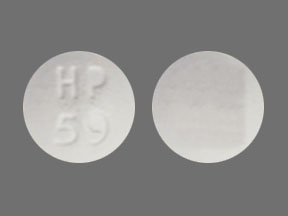
Verapamil Coupons & Savings Card – Discount Prices from $11.46
Verapamil is a medication primarily used to manage high blood pressure, chest pain (angina), and certain types of irregular heartbeats (arrhythmias) in adults. As a calcium channel blocker, Verapamil functions by relaxing blood vessels and slowing the heart rate, which helps improve blood flow and reduces the workload on the heart. This action not only aids in lowering blood pressure but also helps prevent strokes, heart attacks, and kidney problems. Additionally, by increasing the heart's efficiency and reducing the frequency of angina attacks, it enhances exercise capacity and overall comfort. Commonly administered orally, Verapamil is typically taken multiple times a day. Potential side effects include constipation, dizziness, and nausea. Always consult with a healthcare professional before starting or changing treatment with Verapamil.
Our coupons are free to use. Before paying, show the pharmacist your Verapamil savings card to get your free discount. Use our filters below to edit the prescription box to match your needs. The Verapamil prices will update based on your prescription needs. Above our Verapamil coupons, you can change your location to see pharmacy prices and costs in other areas. We're here to help you buy Verapamil at the lowest price with our prescription discount card.
My prescription
Edit
40MG, Verapamil (90 Tablets)
Select pharmacy

CVS
$29.47
COUPON PRICE
Walgreens
$11.46
COUPON PRICE
Albertsons
$19.93
COUPON PRICE
Walmart
$21.05
COUPON PRICEVerapamil savings card
Show this card to your pharmacist
Walgreens
$11.46
BIN
ID
PCN
GRP
015995
LHKPW902204
GDC
DR33
Powered by
Verapamil is a medication primarily used to manage high blood pressure, chest pain (angina), and certain types of irregular heartbeats (arrhythmias) in adults. As a calcium channel blocker, Verapamil functions by relaxing blood vessels and slowing the heart rate, which helps improve blood flow and reduces the workload on the heart. This action not only aids in lowering blood pressure but also helps prevent strokes, heart attacks, and kidney problems. Additionally, by increasing the heart's efficiency and reducing the frequency of angina attacks, it enhances exercise capacity and overall comfort. Commonly administered orally, Verapamil is typically taken multiple times a day. Potential side effects include constipation, dizziness, and nausea. Always consult with a healthcare professional before starting or changing treatment with Verapamil.
Our coupons are free to use. Before paying, show the pharmacist your Verapamil savings card to get your free discount. Use our filters below to edit the prescription box to match your needs. The Verapamil prices will update based on your prescription needs. Above our Verapamil coupons, you can change your location to see pharmacy prices and costs in other areas. We're here to help you buy Verapamil at the lowest price with our prescription discount card.
Related calcium channel blockers prescriptions
More prescriptions for Raynaud's phenomenon
coupons from$173.15Save 63%
Related calcium channel blockers prescriptions
Tiazac Save 42%coupons from $22.09
Nimodipine Save 75%coupons from $136.39
Conjupri Save 76%coupons from $52.83
Norvasc Save 88%coupons from $9.34
Norliqva Save 72%coupons from $508.24
Verelan Save -32%coupons from $124.20
Katerzia Save 72%coupons from $643.71
Cardizem Save 46%coupons from $23.74
More prescriptions for Raynaud's phenomenon
Isradipine Save 63%coupons from $173.15
Verapamil dosage forms
Use our Verapamil 40MG coupon with prices from $21.05 for 90 Tablets. You can also use our Verapamil 40MG coupon with prices from $22.39 for 100 Tablets. We have a Verapamil 80MG coupon with prices from $2.96 for 8 Tablets. You can use our Verapamil 80MG coupon with prices from $4.22 for 30 Tablets.
Dosage Quantity Price from Per unit 40MG 90 Tablets $21.05 $0.23 40MG 100 Tablets $22.39 $0.22 80MG 8 Tablets $2.96 $0.37 80MG 30 Tablets $4.22 $0.14 80MG 60 Tablets $5.95 $0.10 80MG 90 Tablets $14.17 $0.16 80MG 100 Tablets $14.75 $0.15 80MG 500 Tablets $46.90 $0.09 80MG 1000 Tablets $67.50 $0.07 120MG 30 Tablets $4.64 $0.15
| Dosage | Quantity | Price from | Per unit |
|---|---|---|---|
| 40MG | 90 Tablets | $21.05 | $0.23 |
| 40MG | 100 Tablets | $22.39 | $0.22 |
| 80MG | 8 Tablets | $2.96 | $0.37 |
| 80MG | 30 Tablets | $4.22 | $0.14 |
| 80MG | 60 Tablets | $5.95 | $0.10 |
| 80MG | 90 Tablets | $14.17 | $0.16 |
| 80MG | 100 Tablets | $14.75 | $0.15 |
| 80MG | 500 Tablets | $46.90 | $0.09 |
| 80MG | 1000 Tablets | $67.50 | $0.07 |
| 120MG | 30 Tablets | $4.64 | $0.15 |
| 120MG | 90 Tablets | $15.43 | $0.17 |
| 120MG | 100 Tablets | $16.14 | $0.16 |
| 120MG | 500 Tablets | $46.90 | $0.09 |
| 120MG | 1000 Tablets | $67.50 | $0.07 |
